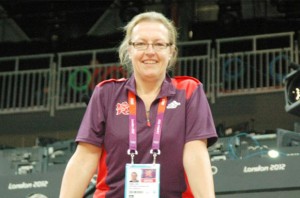Were the London 2012 Olympic Games really worth it?
Posted on Wednesday, November 7 2012

Pupils from three Dorset schools were at Bournemouth University (BU) to debate the legacy of the London 2012 Olympics.
The London 2012: Was It Worth It? event was organized by Dr Debbie Sadd as part of the Economic and Social Research Council’s (ESRC) Festival of Social Science.
Debbie, from BU’s School of Tourism, said she wanted the event to inspire the social scientists of the future.
“We are really trying to engage young people in the social sciences, so that they are able to hear different opinions that perhaps will allow them to influence the decisions that are made,” she said.
“It is brilliant to be engaging with this audience because in five or six years’ time, they could be the ones making the decisions about the London 2012 legacy, and we want to get them to look at all sides of the argument.”
Pupils from Poole Grammar School, Budmouth College and Brockenhurst College visited BU on Monday, and used a digital interactive tool to vote on questions including whether they believe the London 2012 Olympic Games were worth it, and if they think the Games will increase participation in sports.
They then heard presentations about the London 2012 Olympic Games and their potential legacy from speakers including Nigel Reed, from the Weymouth and Portland Chamber of Commerce – where Olympic sailing events took place – who spoke about the costs and benefits of the Games to the town.
Ian Jones, Community, Culture and Sport Manager at BU, told the pupils that the Olympics had led to a cycling club being established at the university with more than 250 active members, while BU graduate James Lee – who now works for GB Rowing – said more women had been inspired to take up the sport.
But they also heard that major sports events do not generally lead to an increase in sports participation, and different sporting governing bodies were now competing for extra funding.
The pupils then voted again, to see if their opinions of the Games had been altered by what they had heard.
Before the presentations, 66 per cent of the pupils said they believed the London 2012 Games were worth it. Afterwards, only 46 per cent believed that was the case.
And, while 71 per cent of them said they believed there were local benefits before they heard from the speakers, only 45 per cent still thought that at the end.
Teacher Jo Ray had brought her AS Level PE Group from Budmouth College, in Weymouth.
She said that the event had been particularly useful as Olympic history and legacy is part of the A Level syllabus.
She said: “Everything we have heard is really key as part of the syllabus. I personally found it really interesting and I imagine the pupils will reflect back on the event and realise they learnt a lot.”
She added: “It is a fantastic opportunity to share knowledge with the university and it’s brilliant for us to come along to an event like this.”
Debbie, who was an Olympic torchbearer when it came through Dorset, added: “What they knew before they came here was what they picked up on TV and in newspapers, but we wanted them to see it was about more than winning gold medals.
“We want them to question more in the future and read more deeply into things and think about the different sides of the stories when it is something this big.
“It will be them who are affected in the future, so we want them to be able to question and ask about what the Olympic legacy will mean for them.”
London 2012: Was It Worth It? was the first of four events being held by Bournemouth University as part of the tenth annual Economic and Social Research Council (ESRC) Festival of Social Science, which celebrates the best of British social science research.
Other events being run by BU will look at the challenges facing older, gay people and how changes to copyright law will impact on the creative industry.
 Bournemouth University
Bournemouth University